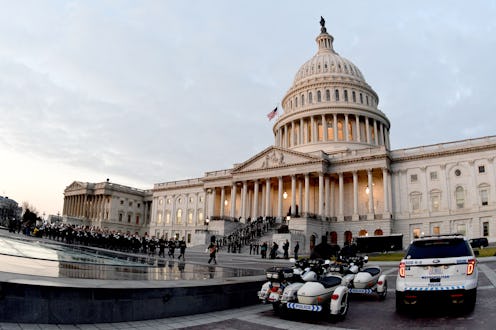News
How To Get "We The People" Posters For Jan. 20

Three artists are attempting to fill the Inauguration Day protests with hopeful images of people of color. The "We the People" posters, commissioned by the social justice and arts organization Amplifier Foundation, were created by Shepard Fairey, who made Obama's 2008 "Hope" poster, Ernesto Yerena, and Jessica Sabogal. Three of the five posters were created by Fairey, and they directly echo the portrait of then-presidential candidate Barack Obama that brought the artist to widespread mainstream attention in 2008. Through various drop spots and free downloads, the art project wants to make sure you can get "We the People" posters for Inauguration Day and the demonstrations that will follow.
Though "We the People" and "Hope" come at two very different milestones in American politics, they both use portraits of people of color to symbolize a hopeful future for America. "Hope" gained viral attention through social media, and "We the People" may do the same in one day via the Women's Marches on Washington, where 100,000 people are estimated to attend on Jan. 21 in D.C. alone.
Until the eve of Inauguration Day, the images are available through the Amplifier Foundation's Kickstarter campaign as postcards, stickers, art prints, and packs of 50 prints intended for wheatpasting. The posters are also available for download, so you can print them out on your own and bring to any one of the over 600 sister marches official organizers estimate are taking place across the globe.
For perhaps the first time in televised history, news coverage of post-Inauguration Day protests will rival that of the ceremony itself. This is especially true in Washington, D.C., where the Amplifier Foundation promises via its Kickstarter campaign page that it will distribute placards with the posters for free to demonstrators there.
Anyone who hasn't come across the "We the People" posters online are sure to see them on their TVs via news coverage by Jan. 21 and, if the campaign's plans are carried out, in Friday's edition of The Washington Post as a full-page ad. The project's Kickstarter has guaranteed funding for the ads, already having surpassed its $60,000 goal. As of noon on Wednesday, pledges were at $1.27 million and counting.
As they note on their website, the Amplifier Foundation partnered with the official Women's March on Washington organizers to sponsor a contest to find artwork specifically to distribute for the march. Five submissions were chosen, but the commissioned pieces by Fairey, Yerena, and Sabogal are receiving much promotion online.
Through this partnership and their selection of images, Amplifier Foundation are visually making clear an issue that has been hotly debated amongst many groups attending sister marches: the place of people of color. As reported by The New York Times, "contentious conversations about race" have been coming up repeatedly amongst march participants in online spaces. At the center of debate is whether the focus of the march should be widespread unity amongst women or celebration of a more intersectional approach that acknowledges the ways women of color experience oppression differently from white women.
Prioritizing women of color is just one issue that is dividing marchers. A recent controversy arose over the initial inclusion of an organization which took a stance against abortion rights; the march's organizers later affirmed that "we are pro-choice as clearly stated in our Unity Principles."
If the "We the People" posters do indeed go viral (but, at the Women's Marches, "IRL") they will facilitate the representation of people of color as the face of resistance against Trump's administration. And if the art campaign has its way, marchers will be holding more portraits of people of color than they will of Trump.